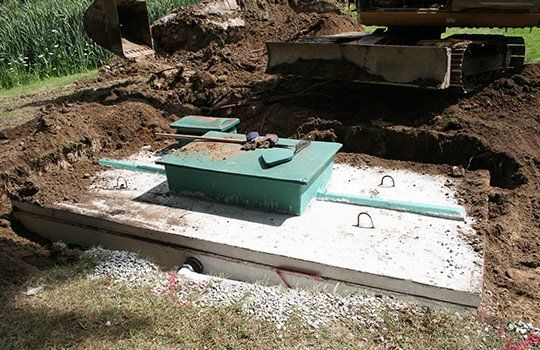If your home site has thin soil over bedrock, a steep slope, or is on a high-water table then an alternative septic system is a replacement for the conventional system. At Dowdy’s Well & Septic Service, we design and install alternative septic systems throughout Richmond, VA, and the surrounding areas. Contact our experienced team today to learn more about alternative septic systems. Give us a call at
(804) 795-1105 to request a project estimate.

What Is An Alternative Septic System Design?
An alternative septic system design refers to any onsite wastewater disposal method other than the widely used conventional septic tank and leach field. In the U.S. most states require that an alternative septic system be designed by a professional and submitted to the local health department for approval. The alternative septic system designer conducts the site and soil inspection and testing, prepares the system design and installation plan, supervises the septic system construction, and certifies that the system was installed as designed.
Alternative septic system designs are used for new or replacement septic systems on difficult sites where soil conditions (such as a rocky site, limited soil percolation rate, or high groundwater level), or other terrain conditions (such as limited space for a septic system or steeply sloped sites) do not permit the installation of a conventional septic tank and drain field system.
Alternative Septic Types & Management
In areas with very slow percolating soils and/or high-water tables, wastewater may surface even on new absorption systems. In areas with soils that percolate too fast, in rocky terrain, or in areas with high water tables, the effluent from a septic tank can move through the soil with little soil treatment, thus polluting underground water supplies or surface waters. In all the above cases, the discharge from the Alternative System, when coupled with properly designed accessories, can prevent these types of health hazards or pollution problems. Alternative septic systems are installed with tanks that utilize only non-corrosive hardware. All hardware items are either PVC, stainless steel, polyethylene, or neoprene. Corrosion is a major problem with buried tanks, particularly when they exist in a corrosive wastewater environment, so you can be sure to have longevity in the life of your system with the following brands that Dowdy's Well & Septic Service supports and recommends.
Single-Pass Sand Filters
Single-pass sand filters treat pathogens well, which is especially important when a system must be placed less than three feet above the water table or bedrock. Because sand filters have been in use for a long time, system design and reliability are well established. The materials needed to make a sand filter are readily available in Minnesota.
Recirculating Sand Filters
RSFs use similar principles as sand filters--with a few differences. The materials in an RSF are coarser (in comparison to a single-pass sand filter) and do not remove feces as effectively. Fine gravel is often used. They are also loaded at a much higher rate and are therefore smaller. RSFs remove a significant amount of nitrogen.
Peat Filters
Peat filters remove pathogens effectively and remove some nutrients as well. They are sometimes sold as manufactured containers, allowing for flexibility of design. Because the medium has an organic base, it breaks down over time and will need to be replaced every 10 to 15 years, which is significantly more often than a sand filter. A disadvantage of peat filters is that the ready-built containers must be placed above the ground surface to breathe, where landscaping may be required to disguise them.
Call (804) 795-1105 to learn more about alternative septic systems.

